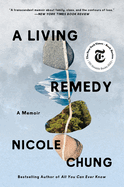
Nicole Chung's first memoir, All You Can Ever Know, looked closely at her experience as a Korean adoptee raised by "color-blind" white parents. With A Living Remedy, Chung again turns a thoughtful eye on her family, this time facing the loss of both parents in a devastating handful of years. Her narrative, understandably, tackles death and grief in all its myriad forms, but it also provides an incisive indictment of the U.S. healthcare system, and the ways it fails those living in economic insecurity.
After attending college across the country, Chung builds a life far from her parents in Oregon, a decision both difficult and necessary. But caring for aging parents at such a distance proves nearly impossible, especially when complications from diabetes and kidney disease strike her father, revealing just how vulnerable they are. She knows her father's death did not have to occur as it did, and writes, "It is still hard for me not to think of my father's death as a kind of negligent homicide, facilitated and sped by the state's failure to fulfill its most basic responsibilities to him and others like him." Then Chung's mother is diagnosed with terminal cancer as Covid-19 lockdowns set in. The distance becomes unbearable, and navigating this grief is its own challenge: "Loss in the time of coronavirus can feel like skirting the borders of a deep, dense forest that is still largely unknown and unexplored." Beautifully written, A Living Remedy faces loss in all its heartrending shades, but mingling in every dark moment is the light and love of family and the unquenchable faith of her parents. --Sara Beth West, freelance reviewer and librarian

